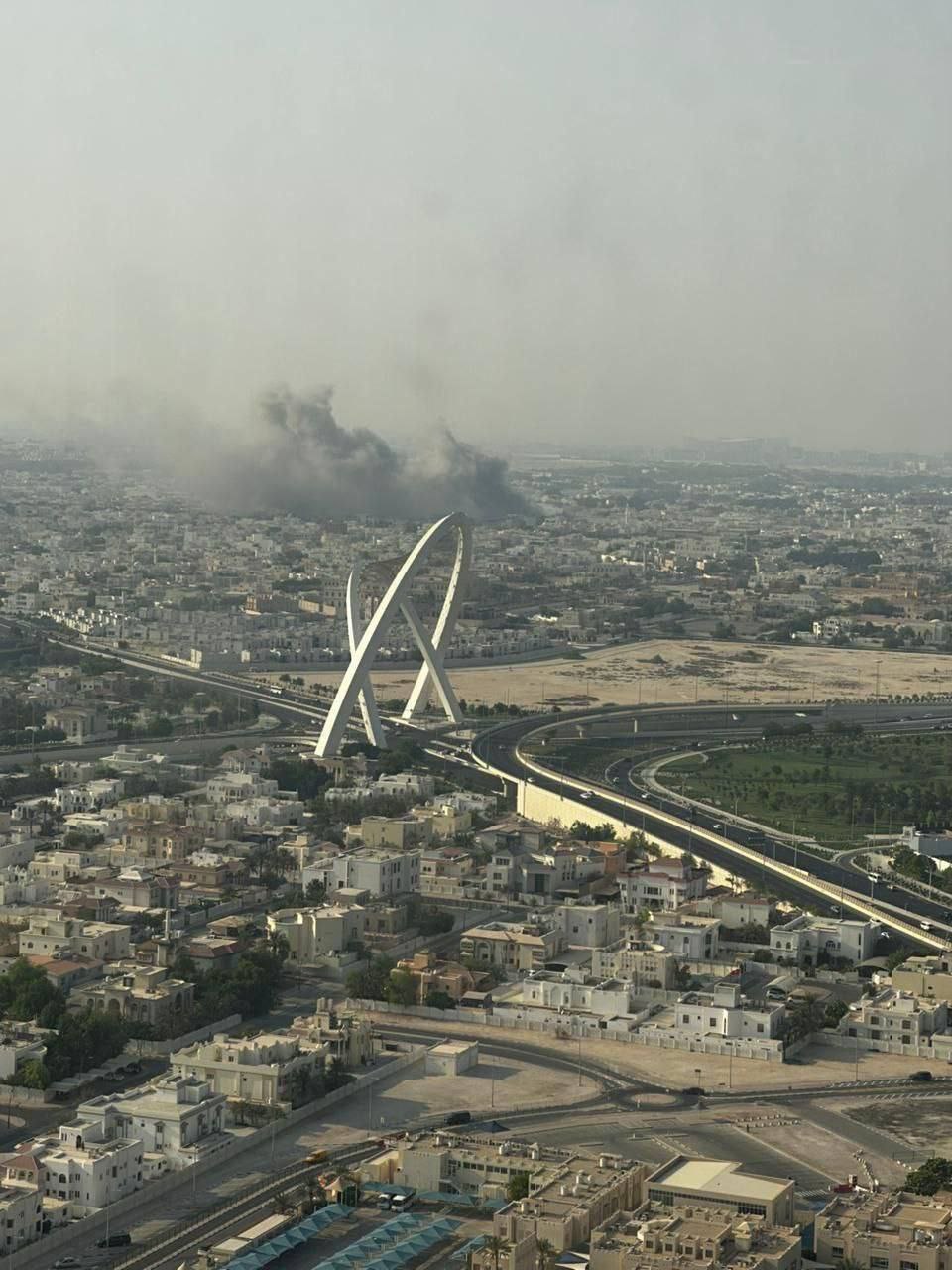
Israel Strikes Hamas Leaders in Qatar Capital for First Time as Doha Condemns Sovereignty Violation
Israeli Strike on Qatar Shatters Middle East Diplomatic Boundaries
Precision Attack in Doha Marks Unprecedented Escalation as Hamas Leaders Targeted During Ceasefire Negotiations
DOHA, Qatar — The sound of explosions that shattered the quiet of Qatar's capital on September 9 marked more than just another military operation in the Middle East's sprawling conflict. When Israeli forces conducted what they termed a "precise strike" targeting senior Hamas leadership in Doha's upscale Katara district, they crossed a diplomatic and geographic red line that analysts say fundamentally alters the regional security landscape.
The unprecedented attack, which sent black smoke billowing over northern Doha just miles from the massive U.S. Al Udeid Air Base, represents the first acknowledged Israeli military action on Qatari soil—a sovereign nation that has served as the primary mediator in Gaza ceasefire negotiations and hosts America's largest military installation in the region.
Multiple explosions reverberated through the capital as Israeli Defense Forces and the Shin Bet security agency executed what they described as a targeted operation against Hamas's political bureau. The timing proved particularly provocative: Hamas negotiators were reportedly meeting to discuss a new U.S.-backed ceasefire proposal when the strike occurred, effectively weaponizing diplomacy itself.
"Weaponizing diplomacy" refers to the practice of leveraging diplomatic tools and processes not for peaceful resolution, but as a strategic instrument to achieve national interests. This involves using international relations, negotiations, or agreements to exert pressure, undermine rivals, or gain an advantage, essentially treating diplomacy as a coercive weapon.
When Thunder Became War in the Gulf's Financial Hub
Eyewitness accounts paint a picture of a city suddenly thrust into conflict. One Doha resident initially mistook the blasts for thunder, until a Lebanese colleague urgently warned them to "stay away from windows" and declared simply: "This is war."
The Israel Defense Forces and Shin Bet issued a joint statement asserting they had carried out the operation using "precision munitions and additional intelligence" to minimize civilian casualties. However, the broader implications of striking within Qatar—a nation that has carefully balanced relationships with both Washington and Tehran while serving as a crucial energy supplier to global markets—extend far beyond the immediate tactical objectives.

Intelligence sources suggest the operation specifically targeted the office of Hamas leader Khalil al-Hayya, though Hamas political figures later claimed their negotiating team survived the assault. The strike's location in the heavily guarded Katara area, near diplomatic compounds and cultural institutions, underscores the sophisticated planning required to execute such an operation in one of the region's most secure capitals.
The Diplomatic Earthquake That Reshapes Regional Calculations
Qatar's condemnation came swiftly and forcefully. The foreign ministry branded the action a "criminal act" and "blatant violation of international laws and norms," while notably stopping short of declaring it an "act of war"—language that analysts interpret as an attempt to preserve Qatar's mediating role while expressing genuine outrage.

The diplomatic implications ripple across multiple dimensions. UN Secretary-General António Guterres criticized the strike as a violation of Qatari sovereignty, calling for renewed focus on ceasefire negotiations rather than escalation. Yet the attack's timing suggests Israel may have deliberately sought to derail those very talks, calculating that eliminating Hamas leadership outweighs the diplomatic costs.
"This represents a regime-shift event that widens the geography of the Gaza conflict beyond any previous boundaries," observed one regional security analyst who requested anonymity. "When a mediating capital becomes a battlefield, the entire framework for conflict resolution changes."
The operation's execution raises critical questions about coordination with U.S. forces. Israeli media reports claimed President Trump had approved the action and that Washington was informed in advance, though Israeli officials simultaneously emphasized the operation's independence. The White House later characterized Trump's position as finding the strike "unfortunate" while confirming U.S. officials had warned Qatar it was imminent.
This apparent contradiction suggests sophisticated diplomatic choreography designed to provide plausible deniability while managing alliance relationships. The proximity to Al Udeid Air Base—housing over 10,000 American personnel—makes any Israeli military operation logistically complex and diplomatically sensitive.

Market Tremors Signal New Risk Premium Era
Financial markets immediately registered the strike's significance, with oil prices jumping over $1 per barrel and gold reaching fresh highs as investors sought safe-haven assets. The reaction, while measured compared to major supply disruptions, reflects recognition that Qatar's role as the world's largest liquefied natural gas exporter makes any security concerns material to global energy markets.
Qatar supplies approximately 20% of global LNG, with its massive Ras Laffan complex serving as a critical node in international energy flows. While the strike occurred far from energy infrastructure, the precedent of military action within Qatar raises questions about sanctuary concepts that have traditionally protected energy-producing capitals.
"We're seeing the emergence of a persistent risk premium that reflects the new reality where no capital is truly off-limits for high-value targets," explained one energy market strategist. "This isn't a supply shock today, but it fundamentally changes how we price geopolitical risk in the Gulf."
Currency markets showed characteristic safe-haven flows, with the Japanese yen and Swiss franc strengthening against risk assets. The Israeli shekel faced pressure from renewed conflict uncertainty, while Qatar's riyal remained stable within its dollar peg framework.
Investment Implications for a New Strategic Reality
The strike's market impact suggests several investment themes that may persist beyond immediate headline volatility. Defense and surveillance technology sectors should benefit from increased regional security spending, particularly Israeli companies specializing in precision weapons and intelligence systems.
Energy markets face a more complex calculus. While Qatar's LNG infrastructure remains physically secure, the psychological impact of military action within a major energy capital could support winter natural gas pricing, especially in Asian markets that depend heavily on Qatari supplies. Calendar spreads favoring longer-dated contracts may prove attractive as markets price in extended geopolitical uncertainty.
Regional equity markets showed resilience, with Qatar's main stock index closing largely unchanged despite the security alerts. However, aviation and tourism sectors across the Gulf may face headwinds from increased war-risk insurance premiums and potential travel advisory escalations.
For fixed income investors, the incident reinforces the value of diversified emerging market exposure while highlighting Israel's elevated credit risk profile. Sovereign credit default swaps should reflect the increased probability of prolonged conflict and potential diplomatic isolation.
Strategic Calculus Points Toward Prolonged Uncertainty
The operation's broader strategic implications extend well beyond immediate tactical gains. By striking Hamas leadership during active ceasefire negotiations, Israel appears to have prioritized military objectives over diplomatic solutions, potentially prolonging the Gaza conflict and expanding its geographic scope.
Regional analysts suggest this calculus reflects Prime Minister Netanyahu's domestic political pressures, where maintaining a war footing may serve electoral interests despite diplomatic costs. The strike simultaneously demonstrates Israel's intelligence capabilities while risking relationships with Gulf states that have increasingly normalized ties.

"Military logic has now clearly superseded political logic in Israeli decision-making," observed one former diplomatic official familiar with regional mediation efforts. "When mediating capitals become potential battlefields, it fundamentally undermines the architecture for conflict resolution."
The incident also tests U.S. influence in managing allied behavior. Washington's apparent advance warning to Qatar suggests awareness of the operation while publicly distancing itself from direct involvement—a delicate balance that preserves relationships while acknowledging operational realities.
Looking Forward: Recalibrating Risk in a New Era
Investment professionals should prepare for a environment where traditional sanctuary assumptions no longer apply. The precedent of military action within Qatar, regardless of justification, establishes that energy-producing capitals may face security challenges previously considered unthinkable.
This shift argues for maintaining optionality in energy markets, with particular attention to LNG pricing dynamics as markets reassess supply security assumptions. Defense technology investments may outperform as regional security spending increases, while traditional Middle East diplomatic frameworks face fundamental challenges.
The incident represents more than tactical escalation—it signals the emergence of a new strategic reality where economic and diplomatic centers cannot assume immunity from military action. For markets accustomed to pricing Middle East risk through traditional supply disruption models, this evolution demands new analytical frameworks that account for expanded geographic and diplomatic uncertainty.
Sanctuary concepts, frequently explored in international relations, refer to designated areas or principles offering protection. Comprehending these "sanctuary zones" is crucial for analyzing and managing geopolitical risks, as their existence and recognition can significantly impact global stability and conflict.
House Investment Thesis
| Category | Summary & Key Points |
|---|---|
| Overall Event | An Israeli kinetic strike inside Doha, Qatar, targeting senior Hamas leadership. This is a regime-shift event that widens the Gaza war's geography and raises the global "sanctuary denial" bar. |
| Base Case (High Probability) | A one-off "decapitation" attempt. The U.S. contains further action in Qatar; diplomacy is impaired but continues. No direct Iran-Qatar escalation. A persistent but modest risk premium ($1–3/bbl) is added to oil; LNG markets firm. |
| Upside Scenario (Medium Prob.) | Regional rhetorical escalation (Iran, Turkey, UAE, Saudi) but remains non-kinetic. Oil gives back most of its initial price pop as macro factors re-assert. |
| Tail Risk (Low Probability) | Spillover into Qatari security or LNG logistics (e.g., a strike near Ras Laffan). This would re-price energy markets materially higher. Considered low due to explicit U.S. redlines. |
| Market Stance / Trades | Add cheap upside optionality: Long Nov/Dec Brent calls; Long JKM (Asia LNG) call spreads vs. short TTF (Europe gas). Overweight defense/ISR stocks. Tactically underweight Israel domestic cyclicals. Maintain war-risk hedges on shipping/insurance. Fade excessive safe-haven FX moves if Iran stays out. |
| Key Confirmed Facts | - Strike occurred in northern Doha. - Qatar and UN condemned it as a sovereignty violation. - U.S. distanced itself, called strike "unfortunate," and stated Trump warned Qatar in advance. - Initial market reaction: oil +1%, gold hit highs, safe-havens bid. |
| Critical Unknowns / Triggers | 1. Hamas leadership status: Verified casualties among top tier (e.g., Khalil al-Hayya) vs. survival. 2. Iran's reaction: A key variable that could quickly reprice markets. 3. Qatar's response: Will it expel delegations or restrict mediation? 4. Method of strike: Revealing the platform/route shapes air-defense narratives. |
| Why No Immediate Supply Shock | 1. Strike was in Doha city, far from Ras Laffan LNG export facilities. 2. U.S. messaging seeks containment and de-escalation. 3. Market reaction is consistent with a risk premium, not a disruption. |
| Bottom Line | Durable but contained risk-premium. This is not a supply shock but a signal that raises the floor on MENA geopolitical pricing. Position for stickier optionality in oil/LNG and defense outperformance. |
Investment decisions should be made in consultation with qualified financial advisors. Past performance does not guarantee future results, and geopolitical developments carry inherent unpredictability that may significantly impact market conditions.
